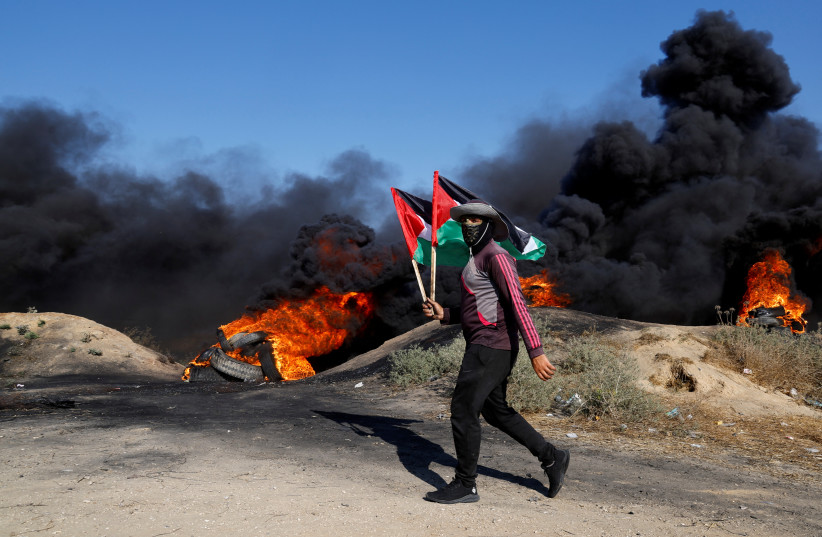The outcome of the Jenin operation is unknown because no one knows how far the IDF is going to go, or how and when West Bank Palestinians and Israel’s enemies, as well as its allies, will react.
Some early data points gathered so far have compared it to Operation Defensive Shield in 2002, however, and also to Operation Break the Wave, which started last March and hasn’t stopped since.
So far, the current operation is a far cry from Defensive Shield, when the IDF occupied large swaths of the West Bank for extended periods of time, with no particular end in mind, and explicitly kept open the possibility of a longer-term stay – if it were needed to reduce terrorism.
IDF's month-long operation in the West Bank
All in all, the IDF left after about a month, although it did maintain cordons around specific villages and continued to go in and out of them in a volume and frequency far above anything it has done over the past year.
That time was characterized by significant fighting that occurred simultaneously throughout the West Bank, with the IDF encircling and placing under siege then-Palestinian Authority president Yasser Arafat.

More than 100 Israelis were killed, including dozens in one bombing alone, before the operation kicked into gear. Dozens of soldiers were killed during the operation, with more than 20,000 reservists called up. About 200 to 400 Palestinians were killed during the operation, with an additional 200 killed the month before. The number of wounded on both sides was high.
So far, nothing on the Israeli or Palestinian side currently comes close to these numbers. Yet this operation is qualitatively different from the routine raids and arrests that the IDF, Shin Bet (Israel Security Agency), and Border Police have been conducting under Operation Break the Wave for more than a year.
Although a dozen airstrikes did take place, airpower had not been used by the IDF in the West Bank – unlike Gaza – since 2006. As well, a full brigade of soldiers has been mobilized – as opposed to a small number of platoons or battalions. In terms of numbers, this is as many as thousands of soldiers in one case and a couple hundred in the other.
IDF's operation signals a strategic shift with temporary gains
Another point of difference is that Prime Minister Benjamin Netanyahu and IDF Chief of Staff Lt.-Gen. Herzi Halevi have been personally following and managing the operation, minute to minute, instead of the middle management of lieutenant-colonels.
The operation would not go on indefinitely, IDF Spokesman Brig.-Gen. Daniel Hagari said Monday, adding that several days was an option. For context, most operations over the last year lasted under an hour, or a few hours at most. This operation could extend for weeks or more if needed, Hagari said.
In addition, IDF Home Front Command is now on high alert, both in the North and the South, concerned that the operation could instigate rocket fire. With all this, it is not even close to what has been happening over the last year, and it is a clear attempt to alter the strategic picture, using a grand show of force.
Yet in terms of the ultimate result, it will likely yield only very temporary tactical achievements for Israel – something akin to mowing the lawn, which then needs to be mowed again soon after.
This is the situation because neither side is really ready for another Defensive Shield, with its high price in life. They also are not ready for a new diplomatic opening that could provide hope for the Palestinian side and douse the popularity of the terrorist groups.
IDF's operation faces tactical limitations and generational resistance
As of press time, there were no Israeli deaths as a result of the operation. This is not only due to talent and luck, but because the IDF is acting very slowly and very strategically in its gun battles. That cannot last if the IDF goes head-to-head with all the terrorist groups over an extended period of time.
The IDF can confiscate hundreds of bombs and guns, but new ones can be made and bought within months. One group of terrorists can be killed or arrested, but another can easily replace them.
Top IDF officials have repeatedly told The Jerusalem Post that one of the main reasons the IDF failed to clamp down on the terrorist wave this past year is that today’s Palestinian teenagers and adolescents do not even remember Defensive Shield. They were born into a post-reality of it, and so they are not deterred from fighting the IDF. They have not met the might of an extended IDF operation.
This one, without much more force or diplomacy, will not change that very fundamental fact.
